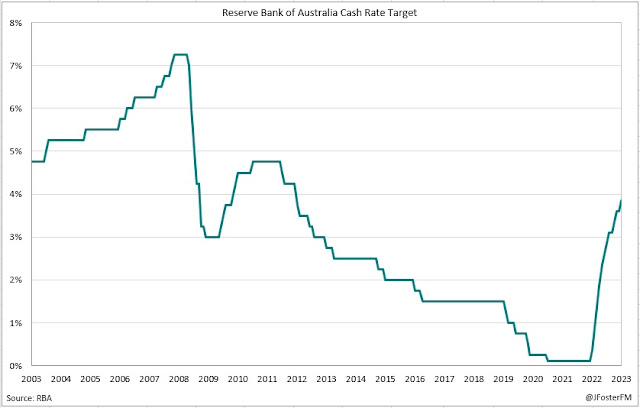The RBA Board meets today (announcement due at 2:30pm AEST) where another line-ball decision is in prospect. Market pricing indicates today's outcome is a close call between an on hold decision or a 25bps rate hike. In the parlance of the Federal Reserve, my prediction is the Board will skip today's meeting to await more data, leaving the cash rate unchanged at 3.85%.
Finely balanced decisions at the RBA's past two meetings resulted in the Board going in different ways on each occasion. In April, it decided to leave rates on hold for the first time in 12 months only to then surprise markets with a 25bps hike in May as its tone turned to focus on the increased risk of persistent inflationary pressures in Australia. Going into today's meeting, the Board's guidance does not provide a clear steer, noting that "some further tightening of monetary policy may be required...but that will depend upon how the economy and inflation evolve". Last week, Governor Philip Lowe told a Senate committee that the Board was in a data dependent mode, indicating it was still assessing the appropriate peak for the cash rate in this tightening cycle.
Ultimately, today's decision comes down to the RBA's interpretation of developments since the May meeting. I think a weak labour market report for April (possibly seasonally related) and Q1's wages growth update that was broadly in line with the RBA's expectations takes some of the pressure off the Board to move today. I also think Q1's GDP report (due tomorrow) is a key input the Board will want to see to gauge the state of household spending and finances.
Arguably, however, the main reason to "skip" today's meeting is to allow the RBA more time to consider the overall effects on the economic and inflation outlook from the recent Federal Budget - in particular the relief on household energy bills - and last week's decision by the Fair Work Commission to increase award pay rates by 5.75% for 2023/24. These factors will be incorporated into the RBA's outlook for the next forecast round at the August meeting, which looks the neatest juncture for further tightening (if required), unless the incoming data demands a move in July.

